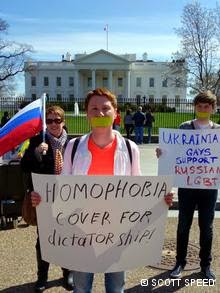Deutsche Welle, 13 April 2014
An
increasing number of gay Russians are applying for asylum in the US. Many feel
threatened in their home country and have experienced physical attacks.
Russia's new "anti-propaganda" laws have worsened the situation.
"It
was a terrible accident," recalls Alex Kovkov during a DW interview. The
car crash he is referring to left him so badly injured that he could hardly say
his name, but the hospital employees refused him treatment. Nobody even offered
him a glass of water.
While this
scenario may sound like a bad dream, for the 33-year-old Russian lawyer it was
a real-life experience. After driving his Mercedes-Benz into a wall at high
speed, he was taken to the renowned Sklifosovsky Institute of Emergency Care
with head injuries and deep cuts - but no emergency care was provided to him.
No help for
gays
"We
don't need HIV-infected people in our hospital," Kovkov was told after
informing hospital staff of his condition as a precautionary measure. He only
still heard the words "go home" and then woke up in the hospital's
psychiatric ward. No treatment was given to him there either. Left alone and
bleeding for a few hours, he eventually mustered up the strength to leave the
hospital and take a taxi home.
In March
2013, several months before his car accident, Kovkov and his boyfriend were
beaten up on a Moscow subway train by two strangers, who had figured out from
their conversation that they were gay. "You are impostors and a disgrace
to our country! Die!" yelled the attackers as they pointed the nozzle of a
fire extinguisher towards Kovkov's eye and attempted to activate it. But Kovkov
was lucky: the extinguisher did not work. "So then they decided to hit us
with it," says Kovkov with a bitter smile.
While his
boyfriend received heavy blows, bleeding from the mouth and sustaining a neck
injury, Kovkov attempted to prevent the worst.
 |
| Russian gay groups want to draw gobal attention to their situation |
"There
were about 20 people in the metro car, but they didn't do anything," he
says. "They just observed how two gays were being beaten up."
After
managing to escape from the metro, they reported the incident to police. But
the officers refused to associate the attack with homophobia. The statement
that such a crime does not exist in Russian law came across as scornful mockery
to the two men. After being put under pressure for an extended period of time,
they finally signed a report stating that they had been attacked for no
apparent reason.
Growing
discrimination
Tanya
Cooper from Human Rights Watch (HRW) sees Kovkov's ordeal as a typical case of
its kind. The so-called propaganda law passed in July 2013, which makes
speaking about homosexuality in front of children punishable, has only worsened
the already precarious situation of gays and lesbians in Russia.
"They
are increasingly exposed to violence," said Cooper, who works for HRW in
Moscow. "The police essentially show them that they are not interested in
investigating attacks against gay people because they feel gay people brought
it on themselves by exposing their homosexuality."
This lack
of support from Russian authorities has prompted many Russian homosexuals and
gay-rights activists to leave the country and seek refuge in more tolerant
societies.
Seeking
asylum
After years
of fear and violence, Kovkov traveled to the US on March 5, shortly before his
33rd birthday. He is receiving support in his asylum application process by
human-rights organization Spectrum.
Being a
certified lawyer, Kovkov documented both violent incidents according to
protocol, but received no response from Russian authorities. In February 2014
he also lost his well-paid job at Gazprom subsidiary GPB EnergoEffect, for
which he started working in December 2011 after being headhunted. He endured
increasing bullying in the office and wrote complaint letters about it to the
managing director and other company managers. These may now come in useful in
the asylum application process, since they act as proof of discrimination based
on sexual orientation.
 |
| Life is not easy for homosexual people in Russia |
There are
no official figures indicating how many Russian homosexuals are currently seeking
asylum in the US. But organizations such as Spectrum, Human Rights Watch and
Immigration Equality have confirmed to DW that interest in information and
support has more than doubled since the introduction of the "propaganda
law" in Russia. Spectrum currently has 16 cases on its books and
Immigration Equality has 44. And while these numbers may sound low, according
to legal advisor Aaron Morris from Immigration Equality only the most serious
cases can be taken up due to capacity limitations. "We haven't lost a
single case yet," he added.
Various
Russian asylum seekers in the US have been trying to draw attention to their
situation. A group of them recently demonstrated in front of the White House,
telling passers-by about the threats and violence they experienced in Russia.
They also felt uncertain about the future, not knowing if they would be able to
remain in the US.
Kovkov also
does not know at this stage whether his application will be successful. He is
sure of one thing, though: he never wants to return to Russia.












No comments:
Post a Comment
Note: Only a member of this blog may post a comment.